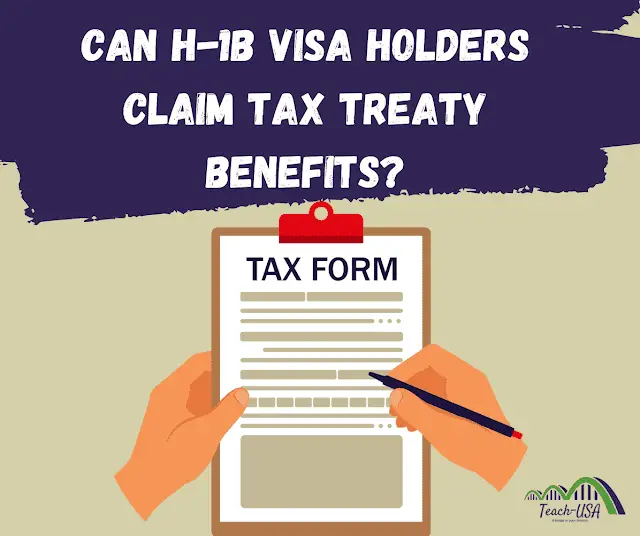✅ Yes, for the first 2 years—H-1B visa holders may qualify for tax treaty benefits if they are considered nonresident aliens under the Substantial Presence Test (SPT). After 2 years, they become resident aliens and generally lose treaty benefits.
Unlike J-1 visa holders, who often receive clear-cut exemptions, H-1B tax treaty benefits vary and depend on the specific treaty between the U.S. and the home country.
1️⃣ Does the U.S.-Philippines Tax Treaty Apply to H-1B Workers?
👉 Yes, but only for the first 2 years—H-1B visa holders may qualify for tax treaty benefits if they are still considered nonresident aliens under the Substantial Presence Test (SPT). After 2 years, they become resident aliens and generally lose treaty benefits.
👉 No, the U.S.-Philippines Tax Treaty does NOT provide tax exemptions for H-1B workers beyond the first 2 years.
The treaty primarily benefits:
- Students (Article 20)
- Teachers & researchers (Article 19) on J-1 visas
Since H-1B visa holders are considered employees, not exchange visitors, they do not qualify for the same treaty exemptions that J-1 visa holders receive. However, during the first two years, while still classified as nonresident aliens, some H-1B holders may qualify for treaty benefits depending on their home country’s tax treaty provisions.
🔹 The U.S.-Philippines Tax Treaty does not extend benefits to H-1B workers, even in the first 2 years.
🔹 However, some other countries (e.g., India, Canada, Germany) have tax treaties that may offer limited benefits for H-1B workers during their first 2 years as nonresidents.
💡 If you’re an H-1B visa holder in your first 2 years, check your country’s tax treaty to see if you qualify for reduced tax rates or exemptions. Always consult a tax professional to ensure compliance.
2️⃣ Key Factors That Determine H-1B Tax Treaty Eligibility
✅ Tax Treaty Between the U.S. and Your Home Country
- The U.S. has tax treaties with many countries, each with different provisions.
- Some treaties offer reduced tax rates on wages, exemptions for certain types of income, or foreign tax credits.
- The U.S.-Philippines treaty does NOT cover H-1B employees.
✅ Tax Residency Status Matters
- Nonresident Alien (First 2 Years on H-1B):
- If an H-1B visa holder has not met the Substantial Presence Test (SPT) (i.e., they have not been in the U.S. for 183 days in a year), they may qualify for tax treaty benefits.
- During this period, they file as a nonresident alien (Form 1040-NR).
- Resident Alien (After 2 Years on H-1B):
- Once an H-1B worker meets the SPT threshold (183+ days per year for over 2 years), they are taxed as U.S. residents and lose tax treaty eligibility.
- They must file Form 1040, report worldwide income, and pay U.S. taxes like a citizen.
✅ Common Treaty Benefits for Some H-1B Holders
If allowed under their home country’s tax treaty, H-1B visa holders (as nonresidents in their first 2 years) may claim:
✔ Reduced withholding tax rates on wages
✔ Exemptions on specific types of income (e.g., scholarships, professional services)
✔ Foreign Tax Credits (FTC) to offset double taxation
3️⃣ How to Claim Tax Treaty Benefits as an H-1B Visa Holder
📌 Step 1: Review Your Home Country’s Tax Treaty with the U.S.
🔹 Check if your country has treaty provisions for H-1B workers. For Filipinos, the treaty does NOT include H-1B employees.
📌 Step 2: Determine Your U.S. Tax Residency Status
🔹 Nonresident Aliens (First 2 Years on H-1B) may qualify for treaty benefits.
🔹 Resident Aliens (After 2 Years on H-1B) must pay U.S. taxes like citizens and cannot claim treaty benefits.
📌 Step 3: File the Correct IRS Forms
If you qualify for treaty benefits, you may need to file:
✔ Form 1040-NR – U.S. Nonresident Alien Tax Return
✔ Form 8833 – Treaty-Based Return Position Disclosure
✔ Form W-8BEN or W-9 – To certify foreign status and reduce withholding tax
📌 Step 4: Check State Tax Rules
- Tax treaties apply only to federal taxes, not state taxes.
- Some states (e.g., California, New Jersey) do not recognize tax treaties, meaning you still owe state taxes.
📌 Step 5: Consult a Tax Professional
💡 Tax treaties can be complex—if you think you qualify, seek advice from a tax expert to avoid IRS penalties.
4️⃣ Summary: Can H-1B Visa Holders Benefit from Tax Treaties?
✔ Yes, for the first 2 years – If they remain nonresident aliens under the Substantial Presence Test.
✔ After 2 years, most H-1B holders become resident aliens and lose treaty benefits.
✔ Tax treaty benefits depend on the home country – Some treaties provide benefits, but not the U.S.-Philippines treaty.
✔ State Taxes Still Apply – Even if you qualify for a federal tax treaty benefit, some states do not honor tax treaties.
Final Takeaway
📌 For Filipino H-1B visa holders, the U.S.-Philippines Tax Treaty does NOT provide special tax benefits. After 2 years, you will pay U.S. taxes as a resident and should focus on maximizing deductions and credits rather than relying on treaty benefits.
📌 For other nationalities, check your home country’s tax treaty to see if you qualify for lower tax rates or exemptions during your first 2 years in the U.S.
💡 Tax planning is key! Always consult a tax professional to avoid costly mistakes and ensure compliance.
—–

